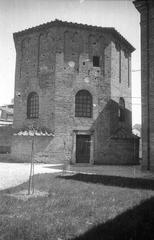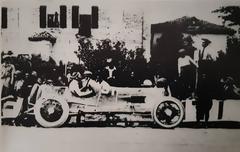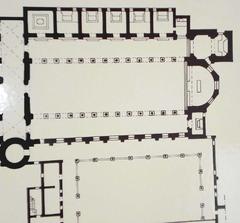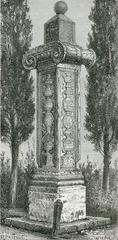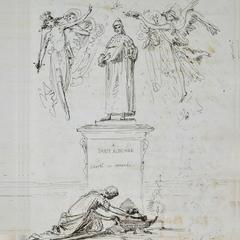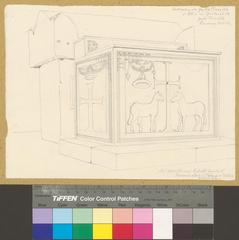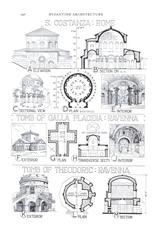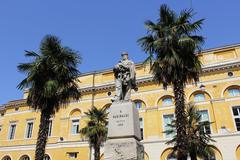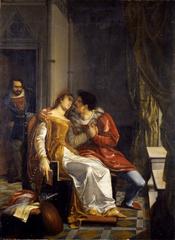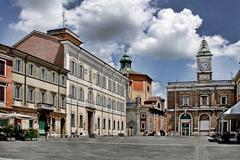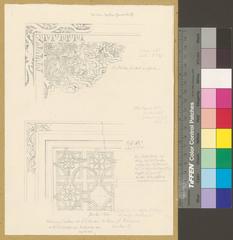Palazzo Guaccimanni: Visiting Hours, Tickets, and Ravenna Historical Sites Guide
Date: 14/06/2025
Introduction
Palazzo Guaccimanni, located in the heart of Ravenna, Italy, is a distinguished Renaissance palace embodying centuries of architectural evolution, artistic heritage, and civic identity. Renowned for its elegant façade, frescoed halls, and integration with Ravenna’s vibrant cultural scene, the palazzo offers visitors a unique journey through the city’s storied past and dynamic present. This comprehensive guide details the history, architectural features, visiting hours, ticketing options, accessibility, nearby attractions, and practical tips for making the most of your visit to this cultural landmark (Sphere Art; Giovanni Mecozzi Architetti; Turismo Ravenna).
1. Historical Significance of Palazzo Guaccimanni
1.1 Origins and Family Legacy
Constructed in the 15th century along Via Armando Diaz, Palazzo Guaccimanni reflects Ravenna’s dynamic transition from medieval stronghold to Renaissance hub. The palazzo was originally home to the Guaccimanni family, influential figures in Ravenna’s political and artistic spheres, especially during the Italian Risorgimento. Luigi Guaccimanni, a prominent patriot, and his sons, Vittorio and Alessandro, both accomplished artists, left a lasting imprint on the city’s cultural fabric (Sphere Art).
1.2 Adaptive Reuse and Restoration
The palazzo has undergone significant restoration, most recently through the Gironda Project led by Giovanni Mecozzi Architetti, which sensitively preserved original Renaissance features while introducing contemporary hospitality and exhibition spaces. The project, recognized for its innovative design, uses reversible interventions and vibrant color palettes to evoke Ravenna’s mosaic tradition, creating a dialogue between historic and modern aesthetics (Giovanni Mecozzi Architetti).
2. Architectural and Artistic Highlights
2.1 Exterior and Courtyard
Palazzo Guaccimanni’s façade exemplifies Renaissance and early Baroque sensibilities, featuring harmonious proportions, symmetrical windows, and decorative stonework. Family crests and ornate portals reflect the prestige of its original owners. The central courtyard, typical of noble residences, provides light and ventilation and serves as an elegant transition between interior and exterior spaces (Visit Romagna).
2.2 Interior Spaces and Frescoes
Inside, the piano nobile (main floor) boasts 16th-century frescoes with cityscape and landscape motifs, neoclassical wooden ceilings, and refined stuccowork. Artistic influences from Ferrara and Venice are evident, and the interiors echo the geometric and floral patterns of Ravenna’s renowned mosaics. Recent renovations introduced contemporary furnishings that highlight and protect the historical fabric (Sphere Art; Professione Architetto).
3. Cultural Role and Contemporary Use
Today, Palazzo Guaccimanni is a living cultural venue, hosting exhibitions, artist residencies, and workshops. Its recent programming includes “SEMI_LUCE,” a photographic exhibition by Simone Bossi, demonstrating the palazzo’s ongoing engagement with contemporary art and its role as a bridge between Ravenna’s past and present (Professione Architetto).
The palazzo’s connections to the Ravenna Mosaic School and the city’s Academy of Fine Arts highlight its contribution to Ravenna’s mosaic heritage. These institutions continue to train new generations of artists, sustaining the city’s global reputation for mosaic artistry (Finestre sull’Arte).
4. Visitor Information: Hours, Tickets, and Accessibility
4.1 Address and Getting There
- Address: Via A. Diaz 15, Ravenna
- Access: A short walk from Ravenna’s train station and main attractions. The city center is pedestrian-friendly; public buses and taxis are available (Wild Trips).
4.2 Visiting Hours
- Standard opening: Tuesday to Sunday, 10:00 AM – 6:00 PM (last entry at 5:30 PM); closed Mondays and public holidays.
- Exhibition hours may vary (e.g., “SEMI_LUCE”: 11:00 AM – 5:00 PM). Always check official announcements for current times (Professione Architetto).
4.3 Tickets and Admission
- General admission: €10 for adults; €7 for students/seniors; free for children under 12.
- Special exhibitions: May be free but require advance booking.
- Guided tours: €5 extra; available in multiple languages by appointment.
- Purchase: At the entrance or online (high season booking recommended).
4.4 Accessibility
- Main floor accessible via ramps and elevators; some historic areas may have limited access.
- Visitors with mobility challenges are encouraged to contact the palazzo in advance for assistance (Turismo Ravenna).
5. Experience Highlights and Visitor Tips
- Art & Architecture: Admire frescoed halls, neoclassical ceilings, and the interplay of historic and modern design.
- Events: Participate in exhibitions, workshops, or cultural events scheduled throughout the year.
- Photography: Permitted on the exterior and, subject to guidelines, inside. Professional photography requires permission.
- Best time to visit: Weekday mornings or late afternoons for a quieter experience.
- Etiquette: Supervise children, do not touch artworks, and respect posted guidelines (Wild Trips).
6. Nearby Ravenna Historical Sites and Attractions
Palazzo Guaccimanni is an ideal starting point for exploring Ravenna’s UNESCO World Heritage Sites:
- Basilica di San Vitale: Celebrated for 6th-century Byzantine mosaics (Wild Trips).
- Mausoleum of Galla Placidia: Famous for its starry mosaic dome.
- Baptistry of Neon: One of Ravenna’s oldest buildings, noted for its mosaics.
- Dante’s Tomb & Basilica di San Francesco: Located in the “Zone of Silence,” steps from the palazzo (Turismo Ravenna).
- Rasponi Crypt and Hanging Gardens: Part of the adjacent Palazzo della Provincia, featuring historic mosaics (Turismo Ravenna).
Local cafés and restaurants nearby offer traditional Romagnolo cuisine, and artisan shops provide unique souvenirs (TripReporter).
7. Safety, Accommodation, and Visitor Services
- Safety: Ravenna is safe, but always supervise valuables and respect local customs.
- Accommodation: The Gironda hospitality project within the palazzo offers boutique lodging, with additional hotels and guesthouses nearby.
- Dining: Sample regional specialties such as piadina and fresh seafood in the city center (TripReporter).
8. Frequently Asked Questions (FAQ)
Q: What are Palazzo Guaccimanni’s opening hours?
A: Typically, Tuesday–Sunday, 10:00 AM–6:00 PM. Exhibition hours may differ.
Q: How much do tickets cost?
A: €10 adults, €7 students/seniors; free entry for children under 12. Special exhibitions may be free but require booking.
Q: Is the site wheelchair accessible?
A: Most main areas are accessible, but some historic sections may have limitations. Contact ahead for details.
Q: Are guided tours offered?
A: Yes, in multiple languages, by prior arrangement.
Q: Can I take photos inside?
A: Yes, for personal use unless restricted during special events; professional photography requires permission.
9. How to Plan Your Visit
- Check official sources for the latest visiting hours and ticketing details (Turismo Ravenna).
- Book in advance for exhibitions or guided tours, especially during festivals.
- Explore nearby sites for a comprehensive Ravenna experience.
- Download the Audiala app for audio guides, real-time visitor updates, and cultural itineraries.
References and Further Reading
- Visiting Palazzo Guaccimanni in Ravenna: History, Tickets, and Travel Tips, Sphere Art
- Giovanni Mecozzi Architetti, Gironda Project
- Palazzo Guaccimanni in Ravenna: Visiting Hours, Tickets, and Historical Significance, Turismo Ravenna
- Palazzo Guaccimanni Visiting Hours, Tickets & Cultural Significance in Ravenna, Provincia di Ravenna
- Palazzo Guaccimanni Visiting Hours, Tickets, and Cultural Guide to Ravenna Historical Sites, Professione Architetto
- Finestre sull’Arte, The 100 Years of the Ravenna Mosaic School
- Visit Romagna, The Art of Ravenna in the 15th and 16th Centuries
- Wild Trips, Ravenna Italy What to Visit
- TripReporter, Insider Guide to Ravenna
